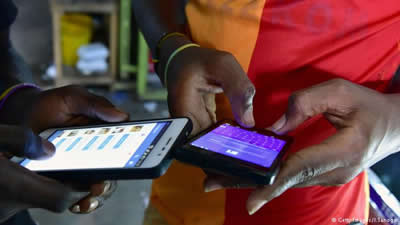Speakers at UNCTAD's eCommerce Week say that uneven patterns of digitalization could create a new class of poverty - the digital poor.
The benefits of going digital, such as better-paid jobs and higher productivity, aren’t automatic or evenly spread, and governments must do more for those being left behind, speakers said on 2 April at the main event of UNCTAD’s eCommerce Week.
The latest estimates put global e-commerce sales at $29 trillion in 2017 – a 44% increase since 2013, when sales were $16 trillion . While such growth is improving the lives of some, almost half the global population remains offline and thus unable to capitalize on the opportunities.
This raises profound development questions that were at the heart of the high-level dialogue, From Digitalization to Development, moderated by BBC correspondent Imogen Foulkes and opened by UNCTAD Secretary-General Mukhisa Kituyi.

“If left unaddressed, the yawning gap between under-connected and hyper-digitalized countries will widen, exacerbating current inequalities,” Dr. Kituyi told the more than 1,200 participants gathering from 1 to 5 April at the United Nations’ European headquarters in Geneva, Switzerland.
Digitalization is much more than an economic tool, he said. It’s a weapon against hunger, disease and climate change.
Glass half full
While some were too optimistic about the power of digitalization to curb poverty, Dr. Kituyi said others have become fixated on certain flaws, throwing “the baby out with the bath water”.
Amani Abou-Zeid, the African Union’s infrastructure and energy chief, agreed, saying she remained hopeful despite the risks.
“These [digital] technologies offer new tools for empowerment that did not exist before,” she said, citing how e-payment is improving the lives of the majority of world’s population still trying to survive in the informal sector.
Ms. Abou-Zeid added: “When I see the women in the markets using the technology to have an income and an account with their names on it…I cannot be but optimistic.”
The World Bank’s director for digital development, Boutheina Guermazi, said she was also optimistic but that bringing online the globe’s unconnected half would require immense, coordinated efforts.
If that doesn’t happen, she said, digitalization will create new pockets of poverty.
“A new class of poor – the digital poor – is something that concerns us as a development institution,” Ms. Guermazi said.
Consumption-production divide
While some speakers thought the connectivity gap was the core issue, David Porteous, founder and chair of global consulting firm BFA, said the real challenge was the growing divide between consumers and producers in the digital economy.
“Many people in most continents will be users of social media,” he said. “What’s not certain is whether they’ll be able to generate incomes that will sustain them and their livelihoods in the future.”
Mr. Porteous said that although the internet has made it easier for people to create businesses, only 20% or so succeed.
“So the question about the digital divide is: how do you deal with that really long 80% tail?”
“How do we make digital a tool of livelihood and production and not merely a tool of consumption?”
It’s business…just online
For Rebecca Enonchong, founder and CEO of AppsTech, a global provider of enterprise application solutions, the first step is to improve the business environment.
“E-commerce is commerce,” she said. “If the business environment in the country is not conducive to business, then e-commerce will suffer – and it will suffer more because we go faster.”
Unfortunately, governments have often done the opposite, she said, citing examples of social media and mobile taxes introduced in several African countries.
“Governments have put in place laws that have harmed the same economy that has been giving them success and money – and it’s incomprehensible,” she said.
“That is not how to support a digital economy.”
Ms. Enonchong said governments must include online business owners in their digital policy discussions if they want to avoid impractical or ill-advised decisions.
Back in the bottle
Malavika Jayaram, executive director of Digital Asia Hub, a non-profit think tank based in Hong Kong, agreed that policy discussions must be more inclusive.
In the pursuit of digitalization, she said, decision makers have neglected the costs to humans and societies.
Ms. Jayaram worried that people would be forced to digitize against their will and sacrifice personal freedom for the good of the economy.
“If we ignore the fact that things that we do in the private sphere are increasingly bleeding into the public sphere and being used to sort, rate, judge and decide our life opportunities for us, I think something very meaningful and fragile is being broken,” she added.
“I don’t think you can put the genie back in the bottle.”


